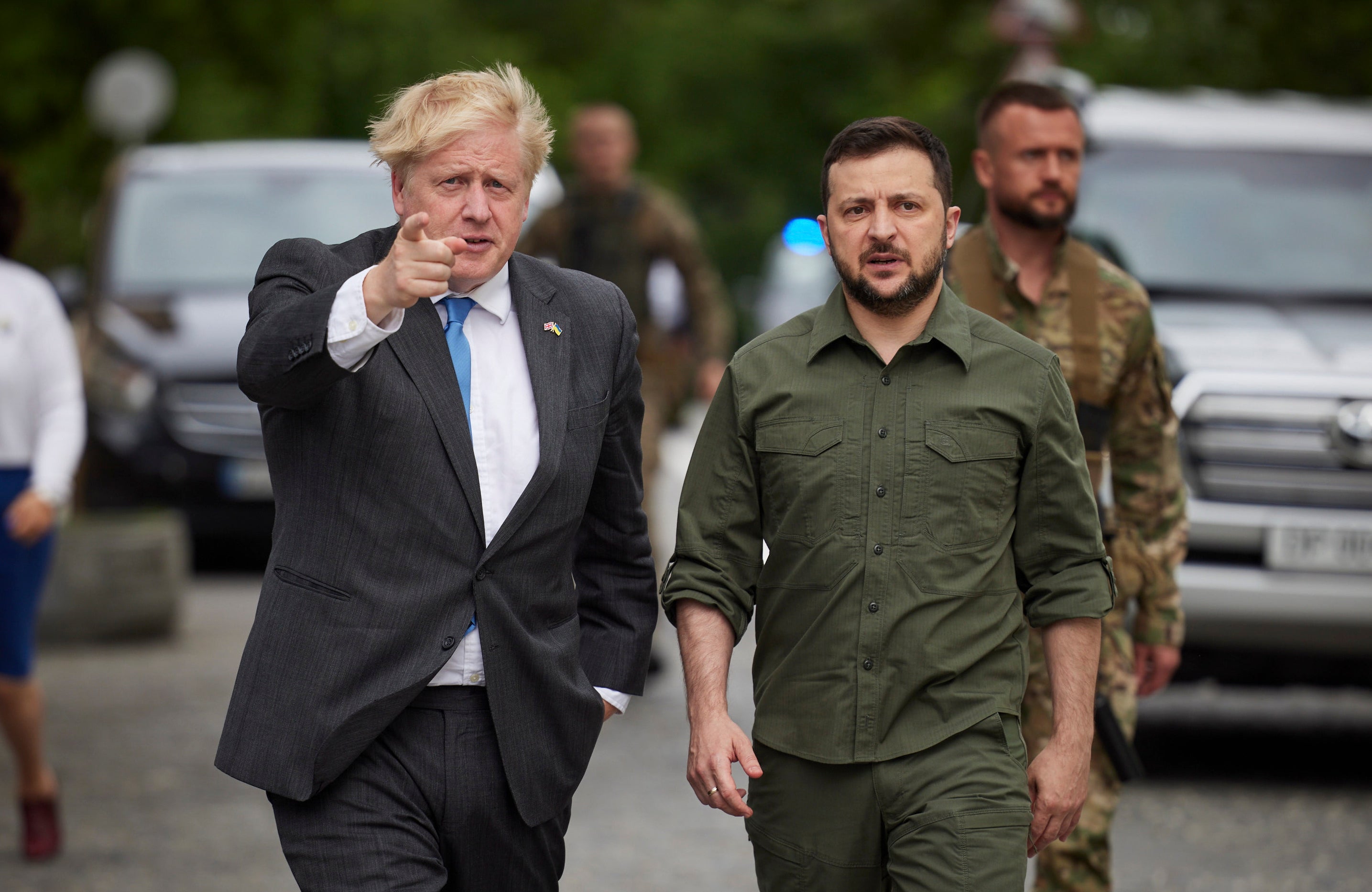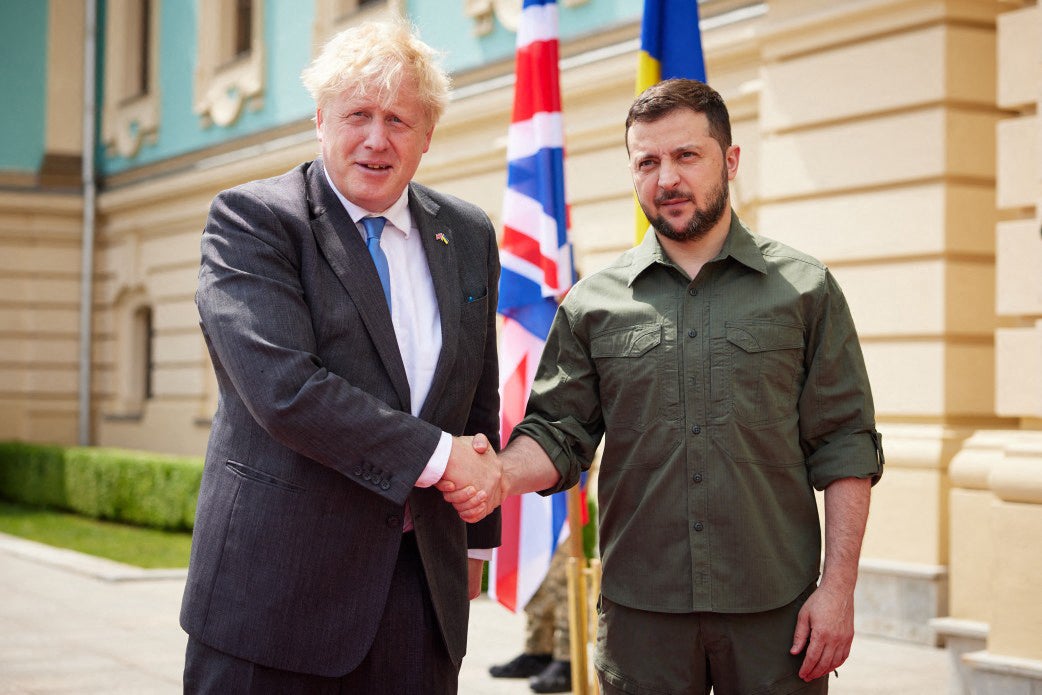We deserve a say in the role Britain plays in Ukraine
If the UK is going to be a party to a war in Europe, aren’t there arguments to be heard, asks Mary Dejevsky, in parliament or any public forum?


Let’s start with the headline that the government and the prime minister have helpfully provided: “The UK will provide an additional £1bn of military support to Ukraine.” What will it be spent on?
It will “go towards capabilities, including sophisticated air defence systems, innovative new electronic warfare equipment and vital kit for Ukrainian soldiers”. And exactly how much is it altogether? “The new funding takes the military aid given to Kyiv to £2.3bn – and the UK has also spent £1.5bn in humanitarian and economic support for Ukraine.”
It is an effort that we can all surely agree is absolutely the right thing to do. Ukraine has been subject to an illegal and brutal invasion by Russia. It is fighting valiantly, against huge odds, for its very survival as a nation. Of course, the West should be helping Ukrainians, under their brave and inspirational leader, Volodymyr Zelensky, and of course, the UK, as one of the richest countries in the world, should not only be helping but playing a leading role. After all, as Ukrainians like to say, their security is also ours.
But is this what the UK is doing in actual fact, and if it is – if we are getting into the defence of Ukraine as deep as it would appear – why is there not even the germ of any national discussion? If the UK is going to be a party to a war in Europe, which it very nearly is, aren’t there arguments to be heard, in parliament or any public forum? After all, quite a lot hangs on questions of peace or war.
So what is the UK doing, exactly? On military assistance, the latest nice round figure of £1bn announced in Madrid almost doubles the sum earmarked by the UK before. The total, as stated, is also second only to that earmarked by the United States. But it is second by a very, very long way. The US Congress has cleared a figure of $40bn (£33bn) – more than 10 times as much – though it is unclear how much has been, or will be, spent.
What can be said is that, in terms of gratitude at least, the UK has earned a generous return on its investment. While Boris Johnson’s recent boast that “UK weapons, equipment and training are transforming Ukraine’s defences” smacks of so much hyperbole, the UK was one of the first countries to provide military aid and Zelensky has singled out the UK for honouring its promises – unlike, it is implied, many others. So that has been a diplomatic plus.
It is probably reasonable to conclude, too, that for the UK – as for the US – military help does not stop at what is declared. Both are sharing intelligence: we know that because the Ukrainians say so, and (according to the New York Times) the US also has intelligence agents and special forces on the ground – as, no doubt, does the UK – and this undeclared help could be at least as valuable, if not more valuable, than the hardware Zelensky asks for so eloquently and so often.

All that said, the cost of defending Ukraine is beyond anything that even the US can pledge. Addressing Nato leaders in Madrid, Zelensky put the monthly cost at $5bn (£4.1bn), which makes even Washington’s $40bn, let alone the UK’s extra £1bn, mere drops in the ocean of the Kyiv government’s needs. Nor is the amount so far spent and pledged by the UK a huge imposition on the UK’s overall budget. Its value is as a gesture of solidarity quite as much as any boost to Ukraine’s defence.
Even rounded up to £4bn, the UK’s direct spending on Ukraine since February is a tiny fraction of, say, the £230bn the UK spent last year on health alone. With the mood in parliament, as in the country at large, overwhelmingly sympathetic to Ukraine, the sums have been uncontentious – so far. And it is possible they will stay that way, with the public, preoccupied with inflation, fuel prices, transport strikes and the rest, content to leave things on the Ukraine front be. But this equanimity about the extent of the UK’s involvement in Ukraine may not, indeed, should not, last.
The fall in media coverage, and the near total absence of any view from the Russian side, have tended to obscure the awkward fact that Russia is gaining ground; slowly and clumsily, but it is gaining ground. Ukraine admits to suffering big losses, and this is starting to pose the highly sensitive question: at what point might it be in Ukraine’s interests to start talking about peace?
In the United States and in parts of continental Europe, this question is solidifying into an increasingly open argument between “peace” – pre-eminently the need to save lives – and “justice”, spanning a spectrum between Russia must be defeated, through to Russia must not be allowed to benefit from its aggression.
The succession of recent summits preserved a very public unanimity on support for Ukraine. The EU approved Ukraine’s candidate membership; the G7 adopted a special statement pledging “unwavering commitment … for as long as it takes”, and Nato agreed to admit Finland and Sweden, while sharply increasing troop deployments in “frontline” member states. But that public unanimity concealed a spread of views, and some sharp divisions, within the US establishment and between “new” and “old” Europe, with Boris Johnson taking the hawkish, “justice” position on the part of the UK.
The conundrum is this: what are the “justice” supporters to do if a time comes when Zelensky decides that, to save his country, he has no choice but to sue for peace. And if that time comes, could he win the argument with his own compatriots, more than 80 per cent of whom, according to a recent poll, currently favour justice over peace, insisting that Ukraine should continue to fight, because – they believe – it can and will win in the end.
There are those in the US, including retired generals, who argue that Nato should then enter the war as an alliance and take on Russia directly (which Nato has so far declined to do). But there are also those who argue that the US cannot underwrite a lost cause. Versions of the same discussion are happening all over Europe – except, conspicuously, in the UK. And it is here that any debate, if it starts, could be the most hotly contested.
To keep up to speed with all the latest opinions and comment, sign up to our free weekly Voices Dispatches newsletter by clicking here
The same poll that showed Ukrainians strongly against stopping the war now, showed that in France, Germany and Italy more favoured “peace” than “justice”, whereas in Poland, the proportions were reversed. In the UK, on the other hand, the two camps were almost evenly balanced – 22 per cent for “peace”, 21 per cent for “justice”, and more “swing” voters – 39 per cent – than anywhere else.
Not for the first time, the spur for an actual debate of high principle in the House of Commons, if not in the wider public forum, could be spurred by a relatively small detail. Asked where the money for the extra £1bn for Ukraine was coming from, the surprisingly frank answer came from the government that it reflected in part the “underspend” on money earmarked for Scotland and Wales.
These are small sums, making up another relatively small sum destined for a brave country trying to defend itself against a bully. But when prices are soaring and hospital queues lengthening, Scotland and Wales might reasonably ask why the money is not coming to them. Then again, this is the conversation we should have begun weeks ago on the risks of an all-out “Russia must lose” policy on Ukraine, and the sooner that debate begins, the better.






Join our commenting forum
Join thought-provoking conversations, follow other Independent readers and see their replies
Comments